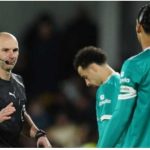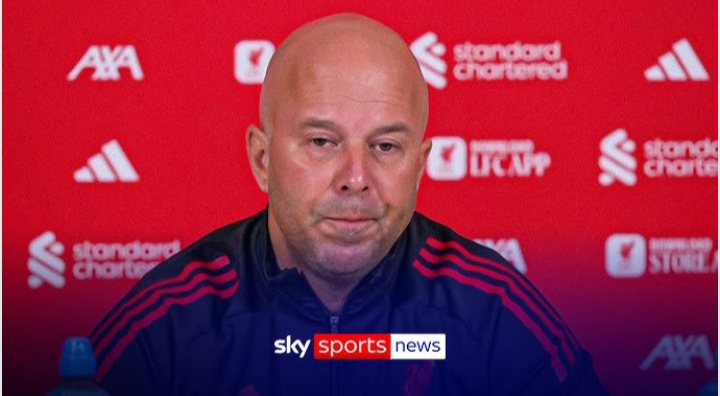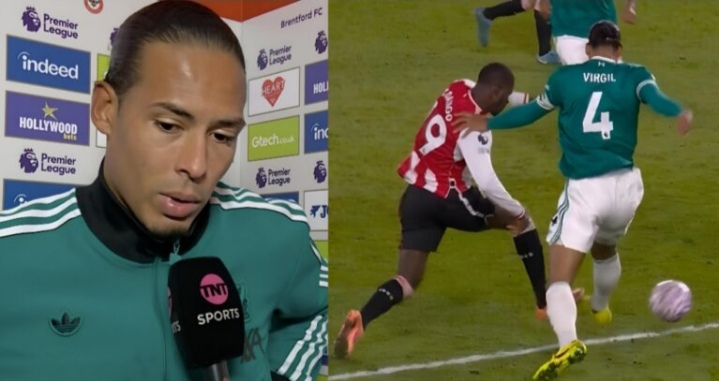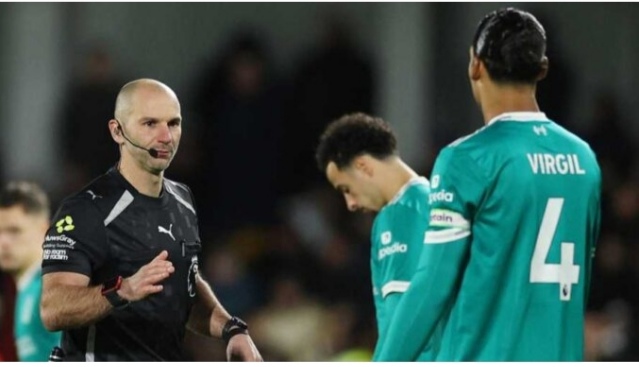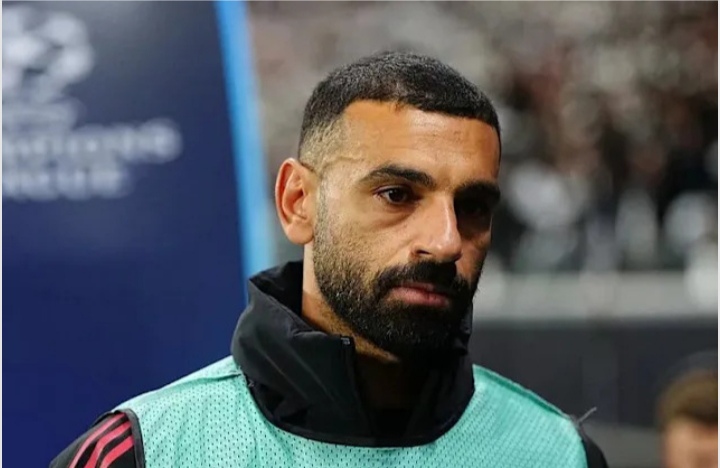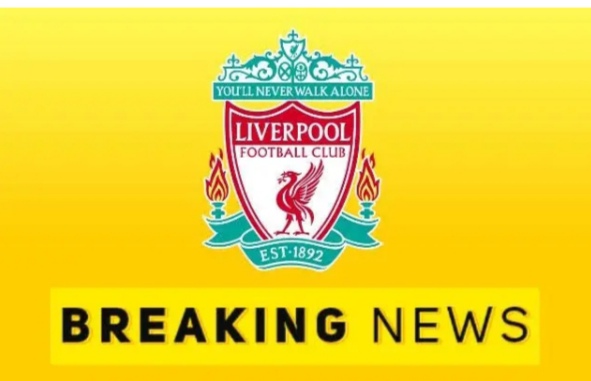It was meant to be the game that changed everything. After a 5–1 demolition of Frankfurt in the Champions League, many believed Liverpool had finally rediscovered their rhythm. But as dusk fell over the Gtech Community Stadium, the Premier League champions were dragged back into familiar misery. The scoreboard read Brentford 3, Liverpool 2, but the real turmoil began long before full time.
At the centre of it all stood Virgil van Dijk, usually the calm commander of Liverpool’s defence. This time, even he seemed lost. Cameras caught him shouting, gesturing, and shaking his head in frustration — much of it aimed at Milos Kerkez, the young Hungarian left-back stepping in for the injured Andy Robertson.
At first, it looked like a captain trying to fire up his team. But as the game went on, the frustration became something else. Each misplaced pass or mistimed challenge from Kerkez drew another angry reaction. By the time the whistle blew, Van Dijk’s handshake with the youngster was stiff and distant.
That was all it took for social media to erupt. “Van Dijk’s had enough of Kerkez,” one fan posted. “You can see it in his body language,” said another. Some went further — “He doesn’t rate him. There’s tension there.”
For a side now suffering four consecutive league defeats, this kind of disharmony is the last thing they need. Yet it matches the mood around Anfield — a growing sense that something deeper is wrong.
Arne Slot, visibly drained, faced reporters afterward. His calm words couldn’t hide his disappointment.
“Disappointing, again,” he said quietly. “You hope that after a strong midweek win, the momentum carries on. But today’s performance was far below our standards.”
He spoke about fundamentals — duels, second balls, set-pieces — the small details Liverpool once mastered but now fail at. “It’s hard to win if the opposition beats you in those areas,” he admitted. Brentford’s opening goal, he revealed, came from a long throw-in — ironically, the very scenario Liverpool had practised defending the previous day. “It’s the only thing we trained on,” he sighed. “We showed clips, prepared for it — and it still happened.”
Then came the penalty that sealed Liverpool’s fate. Slot called it “soft” but refused to use it as an excuse. “We didn’t do the basics right,” he said.
While Slot faced the cameras, Van Dijk stayed silent in the dressing room, still in his kit, staring at the floor. Across from him, Kerkez sat dejected — his first Liverpool goal now meaningless. When he approached his captain, their exchange was short and frosty.
Van Dijk’s anger, insiders say, goes beyond one bad game. Liverpool’s defence has looked shaky for weeks — uncharacteristic errors, poor marking, and constant confusion. Under Klopp, such chaos was rare. Under Slot, it’s becoming routine.
Some suggest Van Dijk has lost faith in Slot’s system — a possession-heavy, fluid pressing style that’s left the team vulnerable. Others think it’s personal. “Van Dijk’s standards are sky-high,” said one source. “When teammates fall short, he takes it personally.”
Online, fans debated whether his behaviour was leadership or arrogance. “He’s meant to guide Kerkez, not humiliate him,” one wrote. Another countered, “He’s the captain. If he doesn’t hold them accountable, who will?”
Slot, meanwhile, faced another round of questions. Asked if this was his most disappointing night as manager, he nodded. “Probably. Usually, we respond when we go behind. But tonight, Brentford dominated the key moments — throws, set-pieces, transitions. They deserved it.”
He even pointed to one missed call — a possible penalty on Cody Gakpo — suggesting both decisions could have gone the other way. “Luck wasn’t with us,” he admitted. “But luck tends to abandon teams that don’t earn it.”
Slot tried to stay rational, blaming growing pains from a summer of change. “When you bring in new players and a new style, setbacks are expected,” he said. “But not four losses in a row. That’s unacceptable.”
Kerkez’s rough night only made things worse — an early yellow card, sloppy passes, constant pressure. Each mistake drew another glare from Van Dijk. Cameras captured him shouting toward the left flank, visibly furious.
For fans, it all felt familiar — echoes of 2021, when injuries and fatigue tore the team apart. Back then, Klopp’s charisma held them together. Slot doesn’t have that connection yet. The players are still adjusting to his methods, and patience is wearing thin.
Even Mohamed Salah’s late goal — a 3–2 lifeline — brought no joy. He barely celebrated, jogging back to midfield with a blank stare. In the stands, applause was muted. Some fans simply left early. Four straight losses — the first time since February 2021 — have turned belief into dread.
Asked whether he feared losing control, Slot gave a weary smile. “We’ll see,” he said. “We play again soon. The only thing to do is respond.” He confirmed Curtis Jones had picked up an injury but tried to stay positive: “He walked off — that’s something.”
The mood on the team bus told its own story — silent, heavy, rain tapping on the windows. Slot rewatched clips on his tablet. Van Dijk stared out the window, earphones in. Kerkez sat a few rows behind, looking out at the dark road ahead. Three players, one team — but worlds apart.
At Anfield, fans are divided. Some insist Slot needs time. Others doubt he’s the right fit. “This doesn’t look like Liverpool,” one supporter wrote. “We look lost and tired.” Another added, “The players don’t believe in the project.”
Pundits have joined the conversation. “When a senior player like Van Dijk starts showing frustration publicly, it spreads,” one ex-pro warned. “Young players lose confidence — and then the defence collapses.”
That’s the danger facing Liverpool now: a breakdown of belief.
Slot’s challenge isn’t just tactical anymore — it’s emotional. He must rebuild trust, calm his captain, and protect his younger players before frustration turns into division.
The Van Dijk–Kerkez tension might seem minor, but in a fragile dressing room, small sparks can start big fires.
Van Dijk has seen Liverpool recover from chaos before — from injuries, setbacks, and heartbreak. But this time feels different. He’s no longer just a leader. He’s part of the storm.
Liverpool’s next game comes quickly. Another loss could tip concern into crisis. Slot’s calm voice may not be enough. Van Dijk’s authority might not hold.
Right now, the club once defined by unity looks fractured — and until they rediscover that togetherness, every throw-in, every mistake, every goal conceded will feel like another step away from the Liverpool that once terrified the world.

